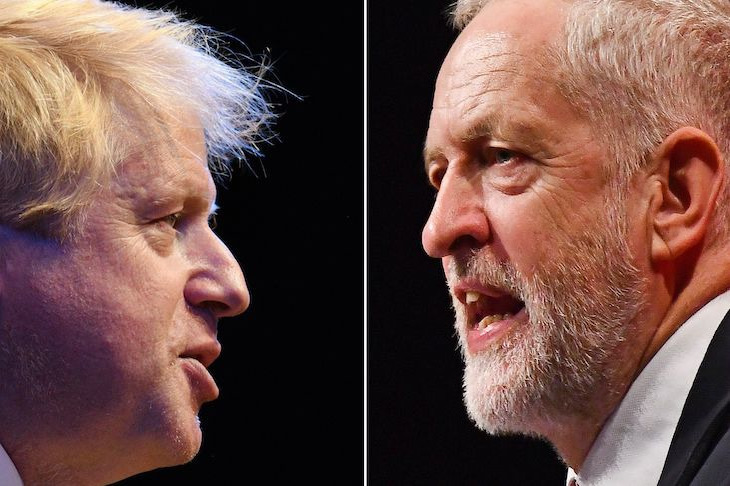Both main British parties are now characterised by intolerance of dissent, leader worship and racism. You can take a historical view and see the rise of extremism as a reaction to the great crash of 2008 and the longest period of wage stagnation since the Napoleonic wars – a country that suffers the economics of the 1930s, cannot expect to escape thirties’ politics.
But the peculiar hypocrisies of British public life are as much to blame as great shifts in the world economy. Britain was meant to be immune from the fanaticism that excited foreigners. That famously unwritten constitution, which assumed statesmen were gentlemen, political parties were broad churches, and dictatorial behaviour wasn’t ‘the done thing’ have fallen victim to the simplest of killer questions
‘Why not?’
Why not suspend Parliament for the longest period since 1945 when every British convention says the executive must be accountable to the legislature during a moment of national crisis? Conventions aren’t laws, as far as anyone can tell. It is not as if armed police will come to arrest Boris Johnson, even if he uses the police to punish allegedly disloyal subordinates.
‘Where does it say that you can’t kill a cop?’ asks Michael Corleone in The Godfather, which inevitably is one of Boris Johnson’s favourite films. (He likes the ‘multiple retribution killings at the end’.) Nowhere, comes the reply, conventions are there to be broken, and the cop is duly executed.
Where does it say you can tell the Queen to ignore legislation banning a no-deal Brexit or that you can’t engage in ‘multiple retribution’ expulsions of dissident MPs?
Half the current Cabinet voted against May’s Withdrawal Agreement and Jeremy Corbyn voted against the Labour whip hundreds of times. But that was in another age when MPs were allowed to follow their consciences. Now the leader can ask, what can stop me purging? The answer, again, seems to be nothing at all.
The Stalinist mindset that demands obedience to the chief is by no means a mental deformation confined to the left. ‘They are undermining the prime minister’s position and that’s why the whip was withdrawn,’ the Johnson loyalist Kwasi Kwarteng said, as he accepted without a blush the ‘principle’ that the enemy of the leader is the enemy of party and, because of the referendum result, the enemy of the people.
Not to be outdone, Labour is beginning its deselection process. As Keir Starmer was struggling to prevent Britain crashing out of the EU, his supporters in Holborn and St Pancras were wearily plodding to meetings to ensure the hard left didn’t move against him. Starmer should be fine, although my contacts in the constituency say they’ve wasted half the summer organising his defence when they might have been opposing the government or just getting on with their lives.
Others will not be so lucky. Jon Lansman, the leader of Momentum, Corbyn’s inner party, wrote to a Labour MP I know to say that half of the MPs who face a deselection ballot will lose the Labour nomination – about 35 MPs by the best available guess.

One way or another the Tory party will become the Brexit party and the Labour party will become the Corbyn party. The unforgivable self-congratulation of the British elite is now being revealed in all its puffed-up emptiness. Far from being an old and stable democracy, that did not need the constitutions and rules of less favoured nations, it turns out this country is just old and suffering from an acute bout of dementia.
On the face of it, the rush to the extremes, the loyalty oaths and forelock-tugging servility appear out of kilter with Britain. Faithfulness to parties in whatever circumstances has never been weaker. Modern people regard such deference as demeaning. But as Donald Trump has shown, weak parties are there for the taking by motivated extremists. The alliance between the Communist party of Britain, Labour left and Muslim Association of Britain that ran the Stop the War coalition during the Iraq war of 2003 and now runs Labour. Vote Leave now controls the Conservatives. The Brexit party isn’t even a party but a private company controlled by its leader, as indeed is Momentum.
Everyone knows how they maintain the support of the hardcore. Johnson is pandering to the most dangerous of the Brexit right by refusing to rule out a no-deal Brexit. Don’t think he won’t appeal to racial prejudice if that is what it takes to win, he has form on that, after all. Corbyn’s lifelong association with anti-Semites is a help not a hindrance with his base, which wants to blame ‘the Rothschilds’ for Britain’s failures as surely as Tories want to blame the EU.
Less discussed is how the first-past-the-post system aids them. The next election is probably only two months away and millions like neither party. Johnson and Corbyn hope that the electoral system will drive the public into line. If you want to stop Johnson you must vote for Corbyn and vice versa. If you don’t want to be ruled by Dominic Cummings, you must submit to being ruled by Seumas Milne and vice versa. If you don’t want to see billions wasted on a no-deal Brexit, you must submit to billions being wasted on a half-baked socialist programme and vice versa. If you can’t stand anti-Semitism, you must accept Islamophobia.
Corbyn and Johnson thus feed off each other and need each other. Fear of Corbyn may just about force reluctant voters to back Johnson, and once more, vice versa.
I still hold out hopes that an alliance of small Remain parties will make enough gains to limit the extremist duopoly. It won’t come anywhere close to winning, but as the brave Conservative MPs who rebelled have reminded us, the character of individual politicians matters. The best we can hope for in these fetid times is to elect as many MPs as possible who reject the devil and the deep blue sea choice our archaic electoral system forces on a powerless public.
An earlier version of this article incorrectly referred to the ‘Muslim Council of Britain’. This has now been corrected to the ‘Muslim Association of Britain’. Our apologies for this error.
Got something to add? Join the discussion and comment below.
Get 10 issues for just $10
Subscribe to The Spectator Australia today for the next 10 magazine issues, plus full online access, for just $10.





















Comments
Don't miss out
Join the conversation with other Spectator Australia readers. Subscribe to leave a comment.
SUBSCRIBEAlready a subscriber? Log in